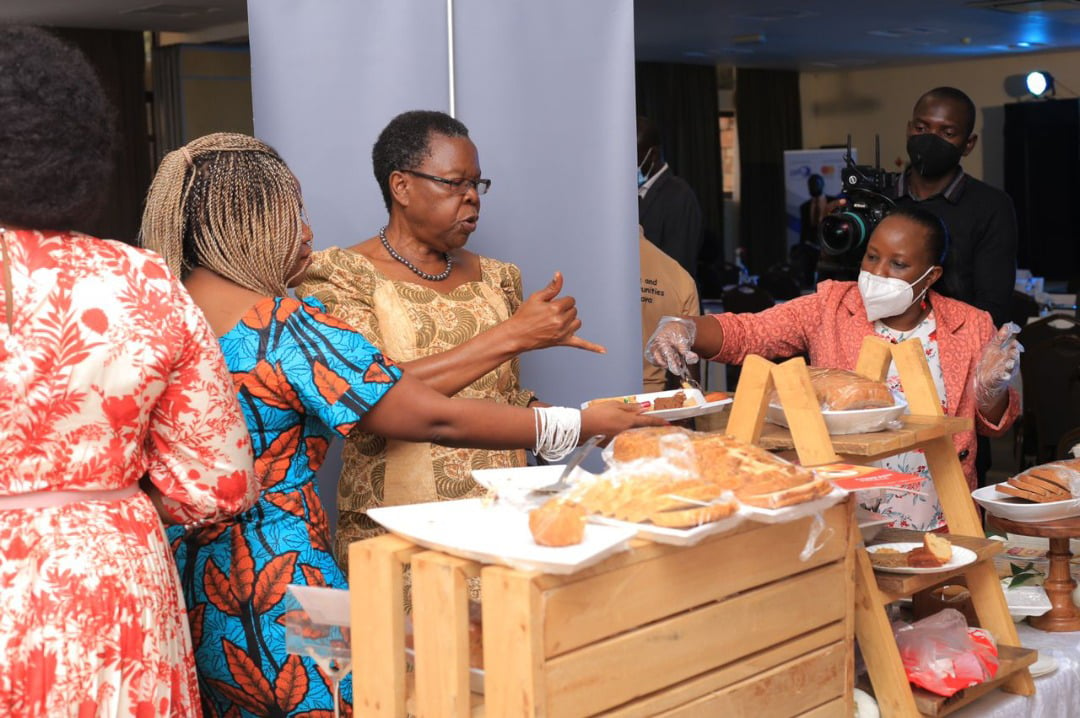Prime
Wheat substitutes: Uganda can replace $120 m imports

Professor Victoria Sekitoleko (centre), the chair agriculture and agribusiness sector at PSFU selects some snacks made out of locally made flour in Kampala. PHOTO/Ismail Musa Ladu
What you need to know:
- Seizing the opportunity. With the high price of wheat and its products, thanks to scarcity from global supply disruptions, we explore what will take for Uganda to to substitute wheat imports with locally made flour such as cassava and pumpkin.
Despite the havoc caused by Covid-19 pandemic on livelihoods, the pandemic has served as a stark reminder of how vulnerable the country’s economy is.
For an economy that is a net importer and “global supermarket” or “dumping ground”, the pandemic has been a wake-up call to the country’s planners and economic managers, who hopefully will use the opportunity as a stepping stone to get the country’s import substitution agenda back on track.
Although there is some commitment in form of a government policy supporting replacing of imports with domestic production (import substitution), private sector players, through their apex body, are already in motion, looking to reduce if not overturn the country’s $7 billion import bill per year.
According to President Museveni, there is no reason “why we should import many of the items contributing to the $7 billion import bill as they can easily be made here in the country”.
Supply chain disruptions
While at it, the Russia – Ukraine situation has since gone to an ugly level, introducing another economic problem of wheat shortage, a widely consumed commodity and raw material for different products. This is further complicated by the exorbitant price of fuel resulting from the Russia – Ukraine invasion, all of which affects the bakery and confectionary industry.
For decades, wheat has constituted a substantial diet of many households, particularly in the city and urban areas. Just in 2020, Uganda imported $119m (Shs447b) in wheat, becoming the 69th largest importer of wheat in the world. According to the same OEC trade data, in the same year, wheat was the sixth most imported product in Uganda. Most of the country’s imports comes from: Russia ($41.9m), Argentina ($31.3m), Ukraine ($15.1m), Germany ($13.8m), and Lithuania ($4.83m).

Workers package cookies. Due to supply chain disruptions as a result of the Russia-Ukraine war, private sector players want Ugandans to take advantage of this crisis to bake pastries out of other flour such as pumpkin and cassava. Photo/Michel Kakumirizi
Grab opportunity
With the high price of wheat and wheat products, thanks to scarcity resulting from global supply disruptions, the Private Sector Foundation Uganda (PSFU), wants its members in the agro-processing value chain to grab the multi-million dollar opportunity and run away with it.
On display during the dialogue were locally sourced or grown wheat substitutes such as cassava, matooke and even pumpkins. Sorghum and simsim products were also on the show. The dialogue therefore aimed to identify the opportunities for innovation, especially in regard to domestic production of wheat or increased production of wheat flour substitutes such as cassava and matooke, that the country’s private sector can exploit amidst the current crisis.
In partnership with MasterCard Foundation-Young Africa, PSFU last week hosted a dialogue in Kampala to address the rising wheat and opportunities for import replacement along the wheat value chain with the theme: “Rising wheat prices: opportunities for import replacement.”
Speaking during the State of the Nation address at Kololo Independence Grounds earlier this month (June 7th), President Yoweri Museveni was of the view that the correct way to deal with the wheat scarcity and subsequent increases in price: “is to get our own substitutes – cassava and banana flour for bread…”
Private sector players along the value chain are hungry for the opportunity although their hands seem tied by structural and organisational issues.
Professor Victoria Sekitoleko, the chair agriculture and agribusiness sector at PSFU, notes that the biggest challenge inhibiting the value chain sector players from making the best of import substitution are issues around access, availability and cost of power which if not solved, will continue to hinder efficient production thereby discouraging import substitution.
Then there is the taxman.
“They just don’t care,” she said.
She continued: “Uganda Revenue Authority should be happy to see that a factory starts and grows. They should be able to work with the new kid on the block for a couple of years before arresting you. This is not helping the course in anyway.”
Even with those glaring challenges, which she says need swift answers, Prof. Sekitoleko, believes Uganda is gifted with alternatives among them cassava, pumpkin, matooke, sweet potatoes, millet and sorghum, that can substitute wheat and all its by-products.
“Already, we have cakes, bread and chapatis made from different flours out of commodities sourced locally. I have just tasted some of them and I love it,” says Prof. Sekitoleko during an interview with Prosper Magazine last week.

Instant Banana (Tooke) flour and cookies are already in about 300 supermarkets in Uganda. PHOTO/Ismail Musa Ladu
On the micro level, value chain players should have an eye for opportunity because rarely does it present itself the way the wheat one (substitution) just did.
According to Ms Rebecca Namugwanya, the chief executive officer of Orga, there will never be enough resources to seize an opportunity like this except for being creative on how you go about deploying your often times scarce resources.
“We need to see the opportunity of import replacement and be creative with our very own resources to come up with wheat-like products that are healthier and cheaper. We have developed a completely gluten free baking flour. This means its 100 per cent wheat free, and with it you can bake everything, including cakes, bread, cookies and the like,” says Namugwanya.
Her story is a good example that wheat substitution is possible using locally sourced raw materials such as pumpkins, rice and cassava.
Market and mindset
It is affordable and now found in a number of supermarkets around Kampala and Wakiso as plans to increase productivity hence expansion to reach the rest of the country are underway.
“As local producers, we still have a big responsibility to educate the mass that one can enjoy these wheat-free products. Other stakeholders like URA, banks, Umeme also need to be supportive, for instance, upscaling for most startup industries is very complicated with the high interest rates for loans, high electricity tariffs and now high fuel prices. The cost of production is too high,” says Namugwanya.
For Mr George William, the managing director, Wind Wood Millers, the current wheat crisis is a blessing for wheat substitutes such as cassava. Already, he is producing bread and cakes with just about 30 per cent of wheat and 70 per cent of locally sourced cassava flour. The total reliance on wheat is diminishing every single day as more substitutes that are generated locally are developed.
Better still, Prof Otim Nape, a leading cassava researcher, thinks, just like in Nigeria, government can introduce a levy on wheat imports which should be injected into financing cassava technologies and related locally sourced wheat import substitutes.
What is needed according to Ms Asha Batenga, the chief executive officer of Cake Shop is mindset change that there are more nutritious, affordable and easily available home-grown options.
Sustainability
The deputy executive director at the Presidential Initiative of Banana Industrial Development in an interview, said the programme that was started as a model for banana value addition to improve incomes, has an opportunity to curve out a new niche.






